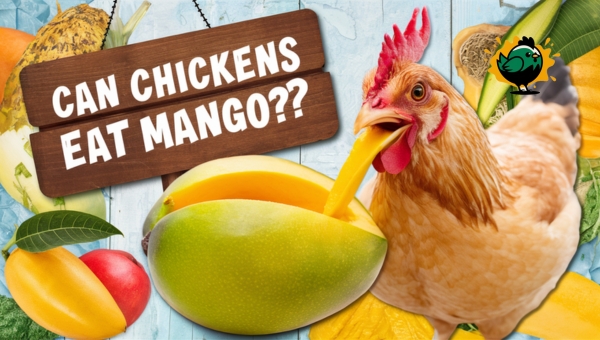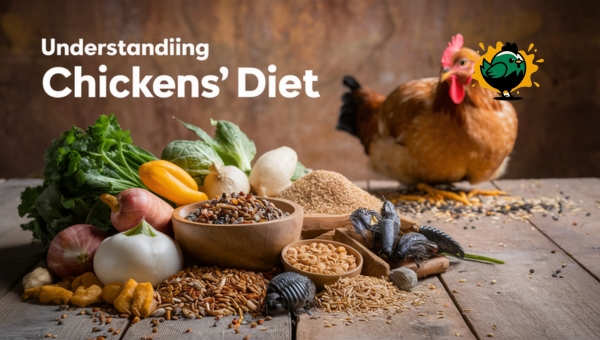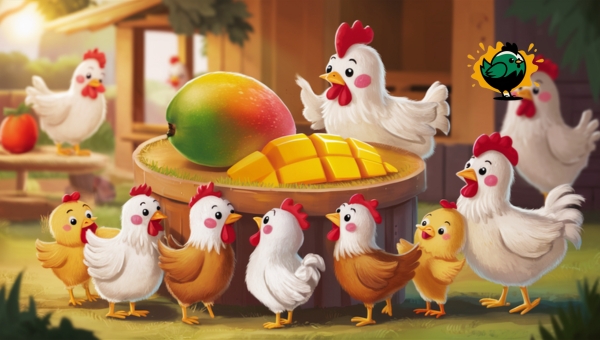Can Chickens Eat Mango? Discover the Juicy Truth!

You’re enjoying a sweet, juicy mango on a sunny afternoon, when your curious chickens start pecking at your feet. You can’t help but wonder—can chickens eat mango? This question might seem trivial, but understanding the dietary needs of your feathered friends is crucial.
Chickens, just like us, need a balanced diet to thrive. Introducing new foods can be both exciting and nerve-wracking. In this article, we’ll explore whether mangoes are a safe treat for your flock, and how they can benefit from this tropical delight. So, let’s dive into the world of chickens and mangoes!
Understanding Chickens’ Diet
Chickens have unique dietary needs, which play a crucial role in their overall health and productivity. Providing a balanced diet ensures that they grow well and lay healthy eggs.

Delving into what foods are beneficial or harmful is essential for anyone raising chickens. In this context, let’s explore the nutritional value of mangoes and their potential benefits for chickens.
Nutritional Value of Mango
Mangoes are not only delicious but also packed with nutrients that can be beneficial to chickens.
Here’s a breakdown of what they offer:
- Vitamin C: Supports the immune system, helping chickens fight off diseases.
- Vitamin A: Essential for maintaining good vision and promoting healthy skin and feathers.
- Potassium: Helps in maintaining fluid balance and nerve function.
- Antioxidants: Protect cells from damage, contributing to overall health.
By including mangoes in a chicken’s diet, these nutrients can enhance their well-being, making it a worthwhile consideration for poultry keepers.
Can Chickens Eat Mango?
Yes, chickens can eat mango, and it can be a healthy addition to their diet. Mangoes are rich in vitamins such as A, C, and E, which contribute to the overall health of chickens. These vitamins support immune function, skin health, and egg production. Additionally, mangoes provide dietary fiber, aiding in digestion.

When feeding mango to chickens, it’s important to remove the pit and skin to avoid choking hazards. The flesh of the mango can be chopped into small pieces, making it easier for chickens to consume.
Moderation is key, as too much fruit can lead to digestive issues. Offering mango as an occasional treat ensures a balanced diet and helps prevent potential health problems.
Also Read: Can Chickens Sweat? Discover Their Cooling Secrets
How to Introduce Mango to Chickens?
Introducing mango to your chickens can be an exciting addition to their diet. However, it’s essential to do it right to ensure they enjoy the fruit safely. Let’s explore different ways to serve mangoes and understand the appropriate serving sizes for your feathered friends.

Serving Methods
When it comes to serving mango to chickens, consider the following methods:
- Fresh Mango Pieces: Cut the mango into small, manageable pieces that are easy for chickens to peck at.
- Mango Puree: Blend the mango into a smooth puree and mix it with their regular feed for a tasty treat.
- Frozen Mango Cubes: Freeze mango pieces and offer them as a refreshing snack on hot days.
- Mango Skins: Peel the mango and offer the skins, as chickens often enjoy pecking at these.
Quantity Guidelines
Determining the right amount of mango to feed chickens is crucial:
- Small Flock: Offer 1-2 tablespoons of mango per chicken.
- Moderate Treat: Ensure mangoes make up no more than 10% of their total diet.
- Frequency: Serve mango as an occasional treat, around 1-2 times a week.
- Monitor Reactions: Watch for any digestive issues and adjust quantities accordingly.
Alternative Fruits for Chickens
When it comes to diversifying your chickens’ diet, fruits can be a delightful addition. They not only provide variety but also essential nutrients that support overall health.
Before serving, it’s key to know which fruits are safe and beneficial for chickens. Let’s explore some popular options and their nutritional benefits.
Popular Options
Chickens can enjoy a range of fruits that are both safe and nutritious. Here are some popular ones:
- Apples: Offer slices without seeds for a crunchy treat.
- Berries: Blueberries, strawberries, and raspberries are small and easy to eat.
- Watermelon: A hydrating snack, perfect for hot days.
- Bananas: Soft and sweet, peel them for easy consumption.
Nutritional Comparisons
Different fruits bring various nutrients to the table. Here’s how they compare:
- Apples: Rich in fiber and vitamin C.
- Berries: Packed with antioxidants and vitamins like C and K.
- Watermelon: High in water content and contains vitamins A and C.
- Bananas: Provide potassium and vitamin B6.
These fruits ensure a balanced diet, contributing to the well-being of your feathered friends.
Conclusion
Chickens can enjoy a variety of fruits, including mangoes, as a delightful addition to their diet. It’s crucial to introduce these fruits in moderation, ensuring they complement the chickens’ primary food sources. Mangoes, with their vitamins and minerals, offer benefits but should not replace a balanced diet.
Exploring different fruits can provide a refreshing diversity to your chickens’ meals, promoting overall health and vitality. Remember, observing your chickens’ reactions to new foods is key to maintaining their well-being.
Interested in learning more about what other treats chickens can enjoy? Dive into more of our informative blogs for insights and tips!
